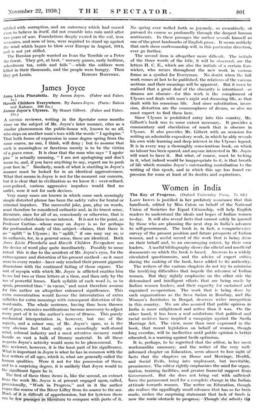James Joyce
A GIFTED reviewer, writing in the Spectator some months since on the subject of Mr. Joyce's later manner, cites as a similar phenomenon the public-house wit, known to us all, who steps on another man's toes with the words " I agolopise."
That both forms of expression in some degree spring from the same source, no one, I think, will deny ; but to assume that
each is meaningless or facetious merely is to be the victim of a grave error. It is clear that the man who says " I agolo- pise " is actually meaning, " I am not apologising and don't mean to, and, if you have anything to say, expect me to push your face in." Similarly, much of what is startling in Joyce's manner must be looked for in an identical aggressiveness. What that means in Joyce is not for the moment our concern, but it is clear that in civilization as we know it : over-refined, over-policed, various aggressive impulses would fmd no outlet, were it not for such devices.
Very many cases are known in which some such seemingly simple distorted phrase has been the safety valve for brutal or criminal impulses. The successful joke, pun, play on words, must therefore be considered cathartic and, in its truest sense, literature, since for all of us, consciously or otherwise, that is literature's chief claim to our interest. It is not to the point, as Professor Curtius—whose essay on Joyce is so far perhaps the profoundest study of this subject—claims, that there is no uplift " in Ulysses ; its " uplift," if one may say so, is its catharsis, for, in a general sense, these are identical. Both Anna Livia Plurabella and liar Childers Everywhere use the device of word play quite inordinately. Possibly to some extent this is due to the accident of Mr. Joyce's eyes, for the extravagance and distortion of his present method—as it must seem to every reader—have only reached their present gigantic dimensions with the continued failing of those organs. The sort of myopia with which Mr. Joyce is afflicted enables him to see but two or three letters at a time, and then only by the use of powerful lenses. Each syllable of each word is, so to speak, presented thus in vacuo," and must therefore assume for this author an altogether enhanced significance. This extra concentration would favour the intercalation of extra syllables for extra meanings with consequent distortion of the word-units. The whole sentence, having thus been thrown out of gear, extensive modifications become necessary to adjust every part of it to the author's sense of fitness. This purely mechanical interpretation is, however, but one of the aspects, and a minor one, of Mr. Joyce's opus, as is the very obvious fact that only an exceedingly well-stored mind, colossal industry and a most retentive memory could handle so vast a bulk of literary material. 'In all these • respects Joyce's activity would seem to be. phenomenal. To this reviewer, however, it is the least part of his significance. What is important in Joyce is what he has in common with the best writers of all ages, which is, what are generally called the human qualities. Were it not for the possession of these, and-to a surprising degree, it is unlikely that Joyce would be the significant figure he is.
The first of these three items is, like the second, an extract from the work Mr. Joyce is at present engaged upon, called, provisionally, "Work in Progress," and in it the author traces the course of the River Liffey from its source to the sea: Mich of it is difficult of apprehension, but for lyricism there can he few pasiageir*liVrAttrre to coMpare with parts or it
No spring ever welled forth so joyously, so evocatively, or pursued its course so profoundly through the deepest human sentiments. In these passages the author reveals himself as one of the great landmarks of English prose. It seems unlikely that such sheer craftsmanship will, in this particular direction, ever go further.
The second item is altogether more difficult. The initials of the three words of the title, it will be observed, are the letters H. C. E., which are also the initials of a certain Ear- wicker, who recurs throughout the new work in various forms as a symbol for Everyman. No doubt when the full work comes at last to be published, the relations of the various sections and their meanings will be apparent. But it must lie realised that a great deal of the obscurity is intentional —as dreams are obscure—for this work is the complement of Ulysses and deals with man's night and dreaming life, as that dealt with his conscious life.- And since substitution, inver- sion, distortion are the commonplaces of dream, so also we must expect to find them here.
Since Ulysses is prohibited entry into this country, Mr. Gilbert's book was to some extent necessary. It provides a commentary and elucidation of much that is obscure in Ulysses. It also provides Mr. Gilbert with an occasion for writing an admirable expository work, in which he ably reveals his own wide learning and deep interest in the Ulysses legend. It is in every way a thoroughly conscientious hook, on which no labour has been spared, and anyone interested in Mr. Joyce will want to have it. But what, of course, must be lacking in it, what indeed would be inappropriate to it, is that breath of-life which remains Joyee'S outstanding contribution to the writing of this epoch, and in which this age has found ex- pression for some at least of its doubts and aspirations.


















































































 Previous page
Previous page